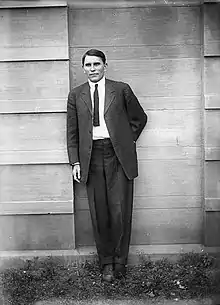Henry Starr
Henry Starr (1873–1921) was an American criminal of the wild west and an American actor of the silent film era.[1]
Henry Starr | |
|---|---|
 Picture of Henry Starr from the Oklahoma Historical Society Photograph Collection | |
| Born | Henry Starr December 2, 1873 |
| Died | February 22, 1921 (aged 47) near Harrison, Arkansas |
Biography
Starr’s parents were Mary Scott Starr and George Starr. Distantly related to Sam Starr, husband of Belle Starr, he was the last in a long line of Starr family criminals.
During Starr’s childhood in Indian Territory, he spent his time around gangs in their hideouts. In 1886, Starr's father passed away. Starr’s widowed mother had to watch three children after that. Later on in life, she married a man named C.N. Walker. Starr disliked him, so he left to become a cowboy at a ranch.
Starr was first arrested and fined for “Introducing spirits into the territory”. Starr was repeatedly arrested for crimes he did not commit. After a while, Starr thought that if he was going to be fined for those crimes, he should just commit a real crime while making a lot of money. That’s when he started to rob banks.[2]
Starr was tried for the murder of Deputy U.S. Marshal Floyd Wilson in 1893.[3][4] Twice sentenced by Judge Isaac Parker to hang for murder, following a series of appeals and Starr's confrontation with Cherokee Bill, who was attempting a prison break, his sentence was reduced to a sentence of imprisonment for manslaughter. Starr was eventually granted a Presidential pardon and released.[5][6]
Starr went on to form a notorious gang that terrorized and robbed throughout northwest Arkansas around the start of the 20th century. They were on a crime spree, and the reward if Starr was caught would be $5,000.[7]
He was imprisoned again in 1915 in Arizona, wrote his autobiography, Thrilling Events, Life of Henry Starr and, released on parole, even portrayed himself in the silent film, A Debtor to the Law (1919).[1] While attempting to rob a bank in Harrison, Arkansas, on February 18, 1921, he was shot by the bank president W. J. Myers with a .38 caliber rifle, and later died of his wounds.[6] Starr is buried at Dewey cemetery in Dewey, Oklahoma.[8]
References
- "Starr, Henry | The Encyclopedia of Oklahoma History and Culture". www.okhistory.org. Retrieved 2020-07-30.
- Treadwell, Terry C. (2021). Outlaws of the Wild West. Great Britain: Frontline Books. ISBN 978-1-52678-237-3. Retrieved 17 May 2022.
- "Henry Starr on trial for murder of Floyd Wilson". The Weekly Star and Kansan. 1893-10-20. p. 2. Retrieved 2020-07-30.
- Burton, Art T. "FLOYD WILSON: FORT SMITH LAWMAN". www.nps.gov. Retrieved 2020-07-30.
- "Henry Starr, the one-time celebrity outlaw". edmondlifeandleisure.com. Retrieved 2020-07-30.
- ""The Shooting Starr" by Neal Murphy". Shelby County Today. 2019-03-22. Retrieved 2020-07-30.
- Treadwell, Terry C. (2021). Outlaws of the Wild West. Great Britain: Frontline Books. ISBN 978-1-52678-237-3. Retrieved 17 May 2022.
- "Henry Starr Buried 40 Years Ago". digitalcollections.tulsalibrary.org. Retrieved 2023-06-29.